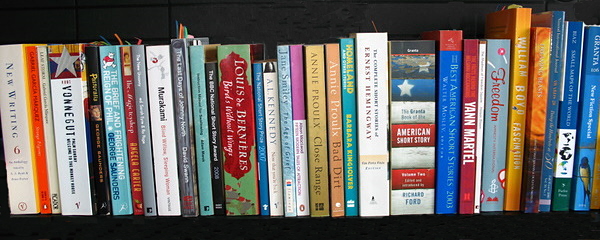
In celebration of World Book Day, we asked our contributors to tell us about their favourite stories in five lines or less. We would also love to hear from YOU. Readers are invited to use the comment box at the bottom of the page to join the conversation and tell us about the stories you love to read.
* * *
Will Bowerman – ‘Solidarity’ by Italo Calvino, in Numbers in the Dark (translated by Tim Parks, Penguin Classics)
This is the story of a man who is walking around town aimlessly one night when he comes across a group of men struggling with a shop shutter. He approaches the group and begins to help. Once they have broken into the shop and begin to fill their bags, the narrator is sent outside to keep watch. Standing on a street corner, he suddenly finds himself standing next to a group of men who are silently closing in on the robbers. The narrator joins them in their ambush, finding himself a passive witness and active participant for both sides of the law.
* * *
Pauline Masurel – ‘A Tree, a Rock, a Cloud’ by Carson McCullers, in The Ballad of the Sad Cafe (Penguin Books)
Set on a rainy night in a streetcar cafe, a man advises a paperboy about how love should be begun, with “A tree. A rock. A cloud.” As in many stories by Carson McCullers we’re reminded that love is not always symmetrical. Yet this story makes me feel hopeful despite the sadness and uncertainty of the man’s situation. Is he crazy? Perhaps you need to be crazy to love without expectation of being loved in return.
Read the story HERE.
* * *
Amanda McAleese – ‘A Temporary Matter’ by Jhumpa Lahiri, in Interpreter of Maladies (Flamingo, 2000)
Proof reader Shoba and her husband Shukumar have become experts at avoiding each other in the six months since their baby was born dead. They reignite their intimacy in five evenings of power cuts – a temporary matter, the notice from the electricity company informs them. When the lights go out, they begin to exchange confessions, then ‘They wept together for the things they now knew.’ I defy you not to weep with them! Satisfying, powerful and profound, a story of consolation.
* * *
Soumya Bhattacharya – ‘Signs and Symbols’ by Vladimir Nabokov, in Collected Stories (Penguin Modern Classics, 2010)
Very short and very powerful, this story is a compassionate yet chilling account of how a father and mother try to deal with their son’s derangement. It is as much an exploration of parental love as the fortitude of a particular kind of marriage as the angst of an immigrant family in America. Filled with images of Nabokovian splendour and precision, ‘Signs and Symbols’ ends with a sense of foreboding hovering in the air. And it is less than 3,000 words long.
* * *
Dora Cogswell – ‘Old Mother Magoun’ by Mary E. Wilkins Freeman, in The Short Fiction of Mary E. Wilkins Freeman and Sarah Orne Jewett (Signet Classic Books)
‘Old Mother Magoun’ is a heartbreaking story of a grandmother’s love for her granddaughter and the tragic choice she is forced to make at a time when women didn’t have many choices. The story takes place in a poor, small New England town at the turn of the century. I found it to be a very moving and powerful story and the portrayal of Mother Mougon is extraordinary. It is a testament to Mary Freeman’s skill that a hundred years later her characters still have the power to move us so.
* * *
Katherine Orr – ‘The Train’ by Raymond Carver, in Cathedral (Vintage New Edition, 2003)
Although the story is set in the waiting room at a station, it is charged, paradoxically, with both momentum and suspense. Carver conjures characters that are vivid and yet full of potential—as they make their entrances they offer tantalising glimpses of larger dramas that are never fully explained. There is an active, inspiring sense of make-believe, and enough space for the reader to feel complicit in the process.
* * *
A.J. Ashworth – ‘A Small, Good Thing’ by Raymond Carver, in Cathedral.
This is one of my favourite stories for a number of reasons. Firstly, it’s just a great story: a boy is knocked down by a car on his birthday and because of this, his mother forgets to collect the birthday cake she ordered for him, leading to a series of cruel phone calls to her and her husband by the baker of the cake. Secondly, it is absolutely bursting with humanity and you can’t fail to be moved – and angered – by what happens. But the moment of redemption at the end, where the couple confront the baker, is just beautiful and has to be one of the most memorable story endings ever written.
* * *
Alison MacLeod – ‘Exchange Rates’ by Lionel Schriver, in the BBC National Short Story Award 2009 anthology
Harold is an ageing History prof. Elliot is his 43-year-old son. Both are Americans. Elliot has become marooned in his life in London after a failed marriage and a variety of financial knocks. Harold is visiting Elliot following a guest lecture at Oxford. The story begins with the paying of the bill after a rather joyless meal. It grows into the story of a painful and all too literal reckoning between father and son. I love the wry but acute observation of English society. I love the precision and verve of the narration. Above all, I love the simplicity and the terrible, kick-to-the-gut poignancy of the ending.
* * *
Juliet West – ‘Daddy’s Girl’ by Jo Cannon, in Insignificant Gestures (Pewter Rose Press, 2010)
The central character is Hana, a shy little girl who has just made her first friend at school and now lives in a fantasy world of fairy wings and pet ferrets. Hana’s father is a suicide bomber, and he’s about to detonate a bomb on the London Underground. We also meet Hana’s isolated mother, a mentally-ill man who is convinced the terrorist attack is his fault, and a teenage girl in the grip of first love. It’s astonishing that in a such a short story, Cannon is able to explore the impact of terrorism through so many different lenses, with such heartbreaking intimacy. Her taut prose and startling use of metaphor make ‘Daddy’s Girl’ an intense and very moving read.
* * *
Loree Westron – ‘The Hellhole’ by Annie Proulx, in Bad Dirt (Fourth Estate, 2009)
Wyoming Game and Fish Warden Creel Zmundzinski knows about the healing power of nature: as an orphaned and recalcitrant youth on course for the state pen, he had experienced redemption in the wilderness. Now, after catching a poacher who has just shot a cow moose in a no-hunting area, leaving its young calf orphaned and defenceless, he finds that nature is also capable of vengeance. With wry humour, Proulx pokes fun at puffed-up out-of-state townies with no respect for either the law or the land, and encourages the reader to question who or what is ultimately in charge.

